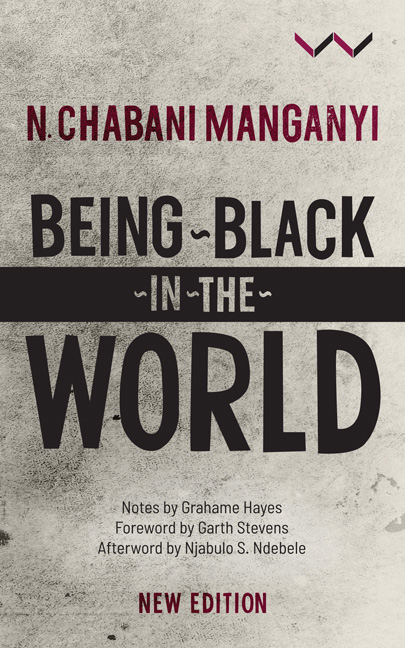Foreword
Published online by Cambridge University Press: 25 October 2019
Summary
Writing a foreword to a seminal text that is being re-published in a different historical moment demands acute sensitivity and a delicate balance. On the one hand, there is the need to be faithful to the authorial voice and preserve the essence of the original text. On the other hand, it is also important to ensure that the text is appropriately framed and located, with perspicacity, for a new generation of readers, even though the authorial voice and textual content originated in a different temporal moment.
This was the task confronting Grahame Hayes, Roshan Cader and myself, as an editorial collective working on the re-publication of N. Chabanyi Manganyi's Being-Black-in-the-World, which was first published in the turbulent political period of 1973. Four primary coordinates propelled and guided an approach to this project. First, many of us as scholars in the arts, humanities and social sciences had been re-engaging with Manganyi's work over several years because we believed him to have been an undervalued critical black intellectual and scholar in South Africa. Many of us were committed to having him appropriately located and recognised within fields such as art, literature, psychology, political science, anthropology and so on. Second, since 2015 South Africa's political landscape had seen a groundswell of calls for decolonising universities, curricula, social institutions, notions of science and art, and a recalibration of what constitutes the canon across most disciplines. The synergies between Manganyi's Being-Black-in-the-World and these decolonising calls for an interrogation of the legacies of coloniality on forms of knowledge, subjectivity and power were patently clear, even though Manganyi was much less known as a public intellectual in comparison to the likes of eminent figures such as Stephen Bantu Biko. Third, this particular iteration of the decolonial turn in South Africa had prompted a re-reading of key black intellectuals such as Aimé Césaire, Frantz Fanon, Biko and, to a different degree, Manganyi. While a number of writers had written about Manganyi's work in the contemporary moment (e.g. Boonzaier and Kessi, 2016), it is Njabulo S. Ndebele's (2018) instructive interpretive essay, ‘“Being-Black-in-the-World” and the Future of “Blackness”’, that reveals the prescient nature of Manganyi's thinking in the 1970s.
- Type
- Chapter
- Information
- Being Black in the World , pp. vii - xviPublisher: Wits University PressPrint publication year: 2019



